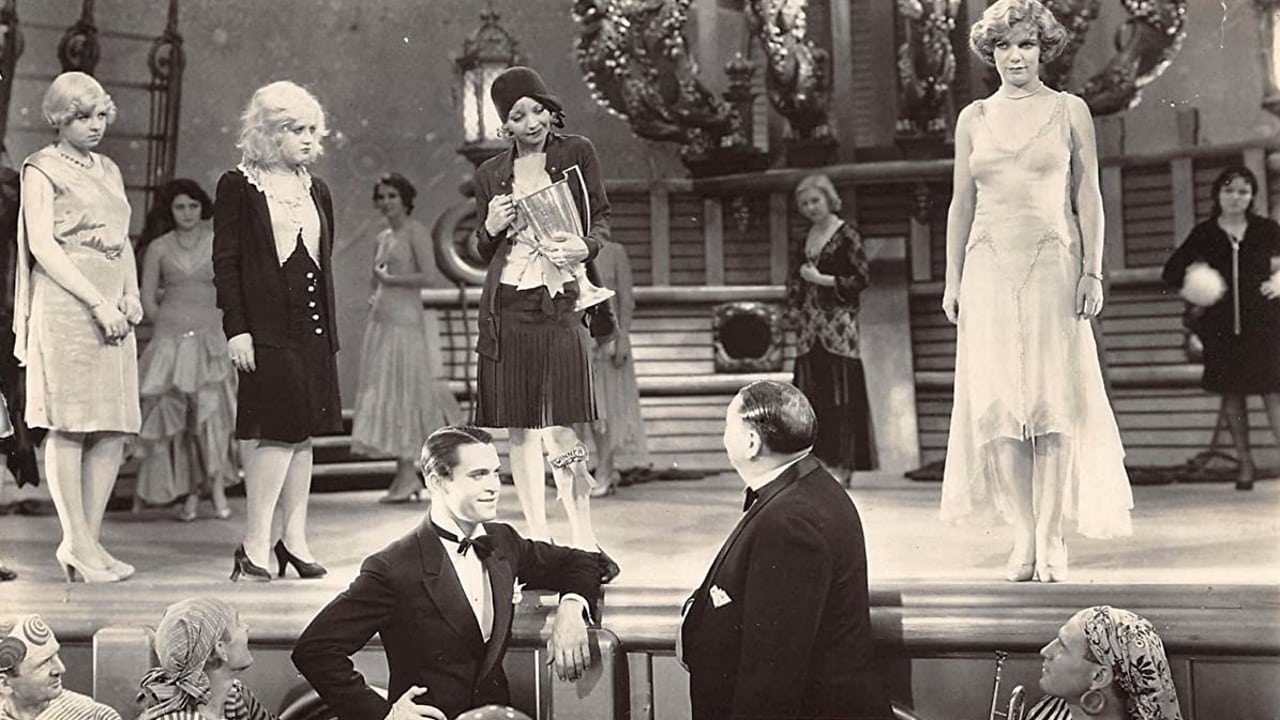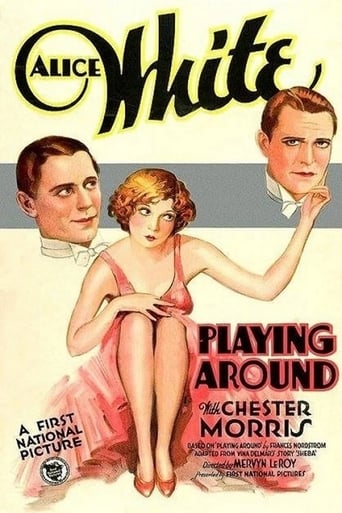lugonian
The moral of the story is its theme song, "We Learn About Love Every Day." The title of the movie is PLAYING AROUND (First National Pictures, 1930), directed by Mervyn Leroy, and starring the young, blonde, pert and sassy Alice White in one of her several leading roles for the studio during the late silent/early talkie era (1927-1931). Being the studio's answer to Paramount's Clara Bow, White didn't have much of a cult following as the legendary "It" Girl, however, whatever films that have survived, PLAYING AROUND is a prime example of White's screen character, as adapted from the story, "Sheba" by Vina Delmar, and based on the play, "Playing Around" by Frances Nordstrom and Adele Commandini.Following a fade-in resembling a pirate movie leading to a production number, the story gets underway with the introduction to its basic characters and how they meet. Set in New York, the story opens in the exclusive Pirates Den restaurant where patron Nicky Soloman (Chester Morris) dines with his male friends. Moments later, Sheba Miller (Alice White), a free-spirited blonde, is escorted by Jack (William Bakewell), her steady boyfriend from her childhood days. After being seated, Jack, with only five dollars in his pocket, finds that after going over the menu, the only thing he can afford is butter milk for 40 cents. Before leaving for a movie, a contest, "Pagent of the Knees" is to take place with Nicky, acting as judge, is to pick out the girl walking cross the stage behind a half-way curtain, with the best looking legs. Of the parade of girls, Nicky chooses Sheba, who not only wins the prize cup, but a free dinner. Feeling awkward about being the center of attention, Jack talks Sheba into leaving. Before the night is over, Nicky, very much interested with the blonde, makes attempts by impressing her, especially by driving his expensive roadster in front of her residence where she lives with her middle-aged father (Richard Carlyle). It would be a matter of time before Sheba begins ignoring her soda-jerking boyfriend making $35 a week for the exciting Nicky, with whom she goes with during the late night hours of fun. Sheba, a working office girl by day, becomes the topic of gossip by a couple of nosy neighbors (Ann Brody and Nellie V. Nichols) while her father, manager of a cigar store across town, wants very much to meet the man she intends to marry. Before the meeting is to take place, Nicky learns the man he robbed and shot earlier that evening happens to be her father. As Sheba gets to learn more about love every day, she needs to get to learn more about the sort of guy she's been dating.As with many early talkies, song interludes are incorporated into the story. With music and lyrics credited to Sammy Stept and Buddy Green, songs include: "You're My Captain Kid," "We Learn About Love Every Day" (sung by Alice White); "That's the Low-down on the Low-down" and "We Learn About Love Every Day Thou."Though the story could hardly be considered fresh and original in 1930, PLAYING AROUND, under Leroy's capable direction, keeps the pace moving, especially when Alice White's character is playing around. Co-star Chester Morris, playing a questionable character, is smooth and quick thinking, a sure reason why any woman would choose him over some nerdy boyfriend (William Bakewell) on a tight budget. Bakewell's characterization becomes annoying at times, which makes one wish his role was awarded to someone in the class of Arthur Lake (Dagwood Bumstead in the "Blondie" film series a decade later), who would have played well as the rejected suitor that could meet with the approval from its movie audience for Lake's ability for intentional humor and conviction. One interesting distinction that gives PLAYING AROUND a sense of originality is the two minute recap of the 66 minute plot recaptured through scenes in song to "We Learn About Love Every Day" by off-screen male vocalist following the THE END title, with nice earful listening to old-style twenties orchestration. Marion Byron, who co-stars as loyal friend and co-worker, Maude, provides a touch of in-humor where she invites Sheba to the movies to see a film starring Al Jolson, "All talking, all singing, all weeping." Could she be making reference to his recent release of SAY IT WITH SONGS (1929)? For all its worth, PLAYING AROUND may be a movie with the roaring twenties feel to it, and very vintage, but regardless of its age featuring flapper beauties, it's still interesting as well as entertaining. Though it doesn't play very often, it can still be found on the cable TV channel of rarely seen oldies on Turner Classic Movies, especially those starring Alice White where being a naughty flirt and playing around happens to be her livelihood as she learns more about love every day. (** roadsters)
calvinnme
...as were most of Alice White's films. Alice would never win any acting awards, but the films she starred in during her brief reign over at First National exemplify the end of the Jazz Age. Alice's characters may have not had the best judgment or the best taste in men, but their intentions were always good, and that is the case here.The film starts out in a nightclub named "The Pirate's Den". A big pirate-themed production number that looks like something that didn't make the final cut in Warner's revue "The Show of Shows" takes up the first five or so minutes - but Alice is nowhere in sight at this point. After the show is over, our stars appear. Sheba and Jack (Alice White and William Bakewell) are out for a night on the town, but Jack gets a headache when he looks at the prices on the menu. At the club at the same time is Nickey Solomon (Chester Morris) who seems to be a likable fellow who enjoys living well. However, he has one major character flaw - his profession is holdup man. Fortunately for the patrons of the club, this is his night off. He and Sheba meet when the club has a "legs contest" in which the female patrons are invited to participate. The curtain is lowered on the stage so you can just see the legs of the participants, and the girls then parade around the stage. Nickey is named judge, and he picks Sheba's legs as the winner(s). When the curtain is raised he sees the rest of Sheba and Nickey is quite taken by the entire package.From this point on Nickey is wooing Sheba, and Jack, who is just a 35 dollar a week soda jerk, is having a hard time competing. The scale is weighed even more heavily in Nickey's favor due to the fact that he is a rather talented liar who has Sheba believing he is a successful businessman. Chester Morris was excellent at playing an evil guy with a nice guy facade, but here you never see the really nasty side of his nature except for one scene. Nickey makes one serious mistake for a holdup guy - driving your own car to robberies and then blowing its unique sounding horn.This film has Alice singing only one number. Besides the opening production number there is another big costumed production number towards the middle of the film also staged at "The Pirates Den". The supporting roles are played well here too. There are a couple of older ladies that live across the alley from Sheba and her father that are always gossiping, and the part of Sheba's poor but loving father is played with heart by Richard Carlyle. Recommended for fans of early talkie fare if it ever crosses your path. In the 16 years I've been watching Turner Classic Movies I don't recall it ever being aired there.

